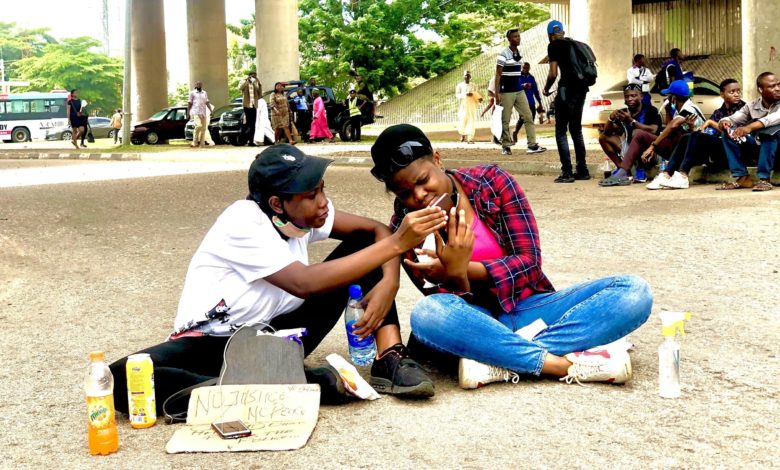Misinformation Shouldn’t Undermine Integrity of #EndSARS Campaign – Experts

#EndSARS hashtag amassed millions of tweets and trended worldwide for over three days on Twitter.
Celebrities, influencers, and politicians have endorsed the online movement against police brutality in Nigeria, the most populous country in Africa.
Twitter verified the accounts of the prominent figures in the struggle and unveiled a new emoji to support the hashtag.
The movement started with peaceful protests in major cities across Nigeria before diffusing to other states where it was hijacked by hoodlums.
Among these hundreds of millions of social media posts, exaggeration, sensationalism and fake news nestled their way into the sincere agitation for police reform.
Old pictures, false claims, and misleading information by some users, either intentionally or innocently, tried to cause chaos, pandemonium and confusion both online and offline.
Several claims of missing people were found to be false. Other people who were claimed to have been killed refuted it by posting that they were alive.
These opened the door for sceptics to claim that #LekkiMassacre was also false and the number of people killed was exaggerated to seek attention.
Rains of False Claims
There were claims peddled to pressure or slow down the #EndSARS protest but many of them were found to be false. They got thousands of reactions within a very short time and moved from one platform to another.
A picture circulated on Twitter and posted on a blog claimed that a Nigerian lady during the ongoing End SARS protest in Enugu refused to fly the Nigerian flag as she mourned tearfully the loss of her brothers to the Special Anti-Robbery Squads, SARS.
However, a fact-check by BBC found the claim to be untrue. “The image is real, and she had joined protests in South-eastern Nigeria,” said BBC.
But when BBC contacted the spokesperson for Ms Ugochukwu, called Gideon Obianime, he told the BBC that the claim was not true.
“He said Ms Ugochukwu herself was briefly detained by SARS forces in 2018, but although she has brothers, none of them had been killed by SARS forces,” concluded BBC.
Other claims include a video shared widely on WhatsApp and uploaded to Twitter which shows women protesting and chanting in Hausa language calling Buhari to release “Mallam”.
Social media users claimed that the women were from Katsina State demanding that President Muhammadu Buhari resign.
A fact-check, however, shows the video was taken in Abuja and shows women members of the Islamic Movement in Nigeria (IMN) calling on President Muhammadu Buhari to release their leader, Sheikh Ibrahim El-Zakzaky, who had been in detention for about four years.
Other social media users have also uploaded a picture of a congested crowd apparently taken in Nigeria claiming it to be a picture of Nigerians protesting against police brutality.
The picture got thousands of reactions on Twitter after it was uploaded by Aubrey Hruby, an American based Africa Investment Advisor, claiming the picture shows young and ambitious African #EndSARS protesters who want to be heard.
A fact-check revealed that the picture shows people who gathered during a protest against the scrapping of oil subsidy at Gani Fawehinmi Park, Ojota in Lagos on January 12, 2012.
Experts Speak
Samad Uthman is a fact-checker who observed how false claims circulated online while the protest lasted. He fact-checked some but many others were out of his control.
“I saw how celebrities were bringing down false posts after our fact checks. I saw the way ordinary citizens and organisations apologised to the public for misleading photos ‘earlier posted’, “he told HumAngle.
Samad said misinformation undermined the integrity of the protest because people thought some events surrounding the protest were exaggerated to mislead the public.
“People are already feeling some events were exaggerated by celebrities and organisations supporting the protest.
“Also, the many cases of looting cannot be disconnected from the extended demands of the campaign.
“Imagine people labelling private properties as COVID-19 palliative by a single post. People just need to always double-check before they react,” Samad said.
Qasim Suleiman, another expert, said some online protesters reacted to the information flying according to their cognitive biases, sharing what they liked and ignoring what they disliked.
“Nigerians react to fake news simply based on their cognitive bias. People do not mind the evidence on the ground.
“In fact at some points, people lose their minds on fake news. They accept any photo, video, or even a text as far as it suits their beliefs,” Qasim said.
The experts advised the protesters to stop peddling unverified claims so as not to destroy the integrity of the protest.
“Nigerians have spent their wealth, energy and voice to end this menace, so I ask why will fake news gain more attention in the struggle more than we want?
“We just need to double-check before we share and be sure of what we are posting online,” Samad advised.
This analysis is produced per HumAngle partnership with the Dubawa 2020 Fellowship to facilitate the ethos of “truth” in journalism and enhance media literacy in Nigeria
Support Our Journalism
There are millions of ordinary people affected by conflict in Africa whose stories are missing in the mainstream media. HumAngle is determined to tell those challenging and under-reported stories, hoping that the people impacted by these conflicts will find the safety and security they deserve.
To ensure that we continue to provide public service coverage, we have a small favour to ask you. We want you to be part of our journalistic endeavour by contributing a token to us.
Your donation will further promote a robust, free, and independent media.
Donate HereStay Closer To The Stories That Matter




